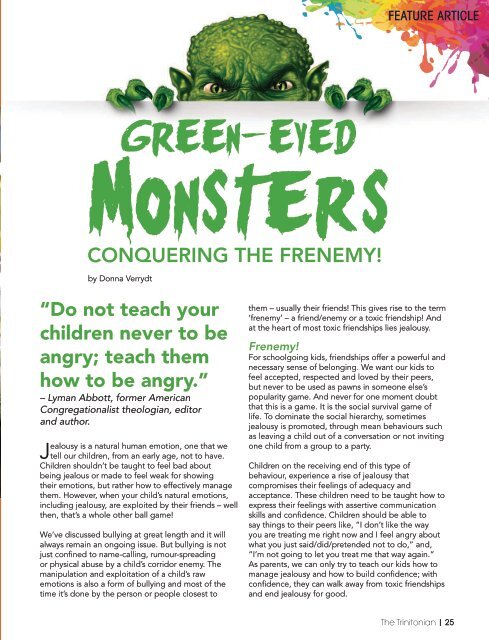TRINITONIAN OCTOBER DIGITAL
You also want an ePaper? Increase the reach of your titles
YUMPU automatically turns print PDFs into web optimized ePapers that Google loves.
FEATURE ARTICLE<br />
Green-eyed<br />
Monsters<br />
CONQUERING THE FRENEMY!<br />
by Donna Verrydt<br />
“Do not teach your<br />
children never to be<br />
angry; teach them<br />
how to be angry.”<br />
– Lyman Abbott, former American<br />
Congregationalist theologian, editor<br />
and author.<br />
Jealousy is a natural human emotion, one that we<br />
tell our children, from an early age, not to have.<br />
Children shouldn’t be taught to feel bad about<br />
being jealous or made to feel weak for showing<br />
their emotions, but rather how to effectively manage<br />
them. However, when your child’s natural emotions,<br />
including jealousy, are exploited by their friends – well<br />
then, that’s a whole other ball game!<br />
We’ve discussed bullying at great length and it will<br />
always remain an ongoing issue. But bullying is not<br />
just confined to name-calling, rumour-spreading<br />
or physical abuse by a child’s corridor enemy. The<br />
manipulation and exploitation of a child’s raw<br />
emotions is also a form of bullying and most of the<br />
time it’s done by the person or people closest to<br />
them – usually their friends! This gives rise to the term<br />
‘frenemy’ – a friend/enemy or a toxic friendship! And<br />
at the heart of most toxic friendships lies jealousy.<br />
Frenemy!<br />
For schoolgoing kids, friendships offer a powerful and<br />
necessary sense of belonging. We want our kids to<br />
feel accepted, respected and loved by their peers,<br />
but never to be used as pawns in someone else’s<br />
popularity game. And never for one moment doubt<br />
that this is a game. It is the social survival game of<br />
life. To dominate the social hierarchy, sometimes<br />
jealousy is promoted, through mean behaviours such<br />
as leaving a child out of a conversation or not inviting<br />
one child from a group to a party.<br />
Children on the receiving end of this type of<br />
behaviour, experience a rise of jealousy that<br />
compromises their feelings of adequacy and<br />
acceptance. These children need to be taught how to<br />
express their feelings with assertive communication<br />
skills and confidence. Children should be able to<br />
say things to their peers like, “I don’t like the way<br />
you are treating me right now and I feel angry about<br />
what you just said/did/pretended not to do,” and,<br />
“I’m not going to let you treat me that way again.”<br />
As parents, we can only try to teach our kids how to<br />
manage jealousy and how to build confidence; with<br />
confidence, they can walk away from toxic friendships<br />
and end jealousy for good.<br />
The Trinitonian | 25


















